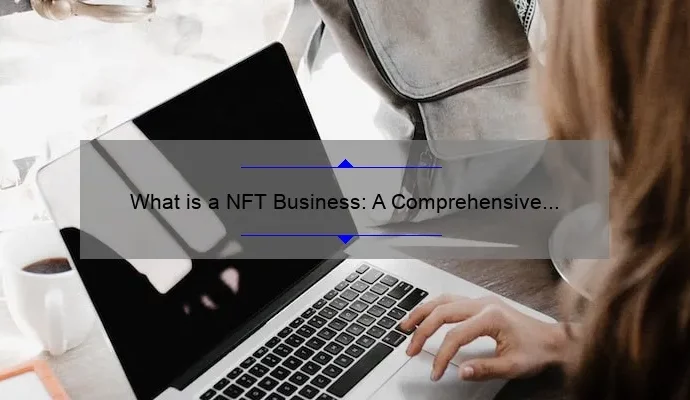Resposta curta: O que é um negócio NFT Um negócio NFT (Non-Fungible Token) refere-se a uma empresa ou empreendimento que se concentra na criação, venda e troca de tokens não substituíveis. Os tokens NFT são ativos digitais exclusivos baseados em blockchain, geralmente usados para representar obras de arte digitais, colecionáveis ou qualquer outro item digital
Resposta curta: O que é um negócio NFT
Um negócio NFT (Non-Fungible Token) refere-se a uma empresa ou empreendimento que se concentra na criação, venda e troca de tokens não substituíveis. Os tokens NFT são ativos digitais exclusivos baseados em blockchain, geralmente usados para representar obras de arte digitais, colecionáveis ou qualquer outro item digital único. Esses negócios exploram o mercado emergente das criptomoedas e oferecem aos usuários a oportunidade de comprar e vender ativos digitais únicos utilizando contratos inteligentes na tecnologia blockchain.
Understanding the Basics: What is a NFT Business?
In the ever-evolving world of technology and finance, one term that has been making waves lately is NFT, or Non-Fungible Token. You may have heard about it in the news or seen artists and musicians selling digital artworks for millions of dollars. But what exactly is an NFT business and why is it gaining so much attention? Let’s delve into the basics and explore this fascinating concept.
Firstly, let’s break down what an NFT actually is. Unlike cryptocurrencies such as Bitcoin or Ethereum, which are fungible and can be exchanged on a like-for-like basis, NFTs are unique digital assets that cannot be replicated or replaced. These tokens are built on blockchain technology, essentially acting as proof of ownership for any digital item they represent.
Now you might wonder – what can be represented by these tokens? The answer is almost anything! Digital art pieces, music albums, videos, virtual real estate, domain names – the possibilities are vast. And with each NFT containing a distinct digital signature that verifies its authenticity and ownership, it opens up incredible opportunities for creators to monetize their work in ways previously unimagined.
So how does an NFT business fit into all of this? Well, as more artists and creative individuals recognize the potential value of their digital creations through tokenization, they are venturing into establishing their own businesses centered around these unique assets. By creating limited editions or exclusive collections of their work as NFTs, artists can sell them directly to collectors via online marketplaces specifically designed for this purpose.
Let’s take an example to better illustrate this concept. Imagine a renowned artist who creates stunning digital paintings. Traditionally, they would exhibit their works in art galleries or sell physical copies to interested buyers. However, with NFTs in play, they can now tokenize these paintings and make them available for purchase in the form of unique digital tokens. Each token represents a one-of-a-kind piece of art, and collectors can bid on or buy these NFTs using cryptocurrency.
As for the clever part – NFTs also come with additional benefits that traditional business models lack. For instance, artists can receive royalties every time their NFT is resold to a new buyer in the future. This means that not only can creators benefit from the initial sale, but they can continue earning income even after their work has changed hands multiple times. This creates a more sustainable revenue stream for artists and strengthens their relationship with collectors.
Additionally, blockchain technology empowers transparency and provenance in the art market. With every transaction recorded on the blockchain, buyers have access to a permanent record of ownership, ensuring that their investment is secure and authentic. This level of trust and traceability adds value to NFT businesses by eliminating concerns related to counterfeit artworks or fraudulent sales.
In conclusion, understanding the basics of an NFT business reveals a world where digital creativity merges with cutting-edge technology and financial systems. Artists and creators are now tapping into this realm to monetize their digital assets in unique ways while revolutionizing traditional business models. So whether you’re an artist seeking new avenues for showcasing your talent or an investor looking to explore exciting opportunities in the digital art market, paying attention to NFT businesses is definitely worthwhile!
Exploring the World of NFTs: How Does a NFT Business Work?
Exploring the World of NFTs: How Does an NFT Business Work?
In recent years, a new buzzword has emerged in the world of digital art and collectibles – NFTs. These Non-Fungible Tokens have taken the market by storm, revolutionizing the way we perceive ownership and value in the digital landscape. But how exactly does an NFT business work? Let’s dive into this fascinating realm where creativity meets blockchain technology.
At its core, an NFT is a unique digital asset that can represent ownership or proof of authenticity for any type of digital content, ranging from artwork and music to videos and virtual real estate. Unlike cryptocurrencies such as Bitcoin or Ethereum, which are fungible and interchangeable with one another, each NFT holds distinct characteristics that make it irreplaceable and one-of-a-kind.
So, let’s imagine you’re an artist looking to delve into the world of NFTs and establish your own NFT business. The first step would be to create your original artwork or digital creation. This could be anything from a stunning painting to a unique 3D sculpture or even a catchy melody. The key here is to bring your artistic vision to life in a format that can be tokenized digitally.
Once your masterpiece is ready, you would then need to choose a suitable platform for minting and selling your NFTs. Several popular platforms like OpenSea, Rarible, and SuperRare are available for artists to showcase their work and engage with potential buyers. Each platform may have different fees or requirements for listing your creations, so it’s essential to do thorough research before settling on one.
When you upload your artwork onto the selected platform, it will undergo a process called minting. Minting involves creating a unique token on the blockchain network that represents your artwork’s ownership rights. Typically built on Ethereum’s blockchain using smart contracts, these tokens serve as certificates of authenticity for your digital assets.
The minting process generates a certain number of tokens for your artwork, and each token is associated with its metadata, including the artist’s name, description, and other relevant details. The smart contract code ensures that only the owner of the NFT can transfer or sell it to another party. This provides artists with greater control over their creations, preventing unauthorized duplication or infringement.
Once your NFTs are minted and listed on the platform, they become available for purchase by collectors and enthusiasts. Potential buyers can browse through a wide array of digital masterpieces from various artists worldwide. And this is where the value of scarcity plays a crucial role in determining an NFT’s price.
Unlike traditional art markets where physical limitations dictate scarcity, NFTs offer virtual uniqueness. This exclusivity drives demand as collectors seek to own something truly original within the digital realm. Factors such as rarity, perceived value, artist reputation, and even current trends heavily influence the price tags attached to these one-of-a-kind tokens.
When someone purchases your NFT, you as the creator receive a percentage of that transaction as royalties. This royalty feature sets NFTs apart from traditional art sales since every subsequent resale of your piece down the line will continue to generate income for you.
In addition to selling individual pieces, some artists also explore creating limited editions or collections bundled together into packs. These packs might contain different rarity levels or unlockables that increase their desirability and value.
As an NFT business owner, it’s vital to actively promote your creations through various marketing channels like social media platforms or collaborations with influencers in relevant communities. Building a strong online presence and establishing connections within the blockchain ecosystem enables you to reach wider audiences and attract potential buyers passionately interested in digital art collectibles.
It’s important to note that while NFTs have gained immense popularity recently, they do come with their fair share of controversy. Environmental concerns related to the extensive energy consumption of blockchain networks and debates around the true value of digital ownership are just a few topics that continue to raise questions within this space.
Nonetheless, NFTs provide an exciting avenue for artists to monetize their digital creations, expand their reach, and establish long-term connections with collectors worldwide. This rapidly evolving market offers endless opportunities for creative individuals willing to explore the intersection between art, technology, and business.
In conclusion, delving into the world of NFTs and establishing an NFT business involves creating unique digital assets, minting these assets on suitable platforms using smart contracts, promoting your creations through marketing efforts, and engaging with the ever-growing community of collectors. While there may be challenges along the way, embracing this innovative landscape can open doors to new horizons for artists seeking recognition and financial success in the digital age.
Step-by-Step Guide: Setting Up Your Own NFT Business
Title: From Novice to NFT Expert: A Step-by-Step Guide on Establishing Your Own Thriving NFT Business
Introduction:
In recent years, the world has witnessed an explosion of interest in the realm of non-fungible tokens (NFTs). These unique digital assets have transcended conventional marketplaces, showcasing remarkable potential for artists, collectors, and entrepreneurs. If you desire to tap into this flourishing industry and establish your own thriving NFT business, look no further! In this comprehensive step-by-step guide, we will walk you through the intricate process of setting up your own NFT empire – from initial conceptualization to marketing strategies and beyond.
1. Developing a Concrete Business Plan:
Just like any successful endeavor, a well-thought-out business plan is crucial when diving into the world of NFTs. Begin by identifying your niche – whether it be art, music, gaming collectibles, or even virtual real estate. Clearly outline your goals, target audience, potential revenue streams, and distinctive value proposition that will set you apart from competitors.
2. Acquiring Authentic Digital Assets:
To forge a reputable name in the NFT marketplace, sourcing authentic and high-quality digital assets is of utmost importance. Collaborate with proficient artists or creators who align with your business vision and can produce captivating visuals or original content that resonates with collectors. Remember: fostering relationships built on trust and mutual respect are essential for long-term success.
3. Minting Your First Batch of NFTs:
Once you’ve gathered exceptional digital assets and collaborated with skilled creators, it’s time to mint your very first collection of NFTs! Choose a reliable blockchain platform such as Ethereum or Binance Smart Chain to ensure seamless integration while maintaining transparency and security within each transaction. Ensure thorough documentation of each asset’s uniqueness through metadata attachment.
4. Building an Engaging Online Marketplace:
Now comes the exciting part – designing an alluring online marketplace to showcase and sell your NFTs! Craft an intuitive and visually stunning website that showcases each unique asset with comprehensive descriptions, artist backgrounds, and any additional attributes to pique the interest of potential collectors. An easy-to-navigate interface coupled with robust search functionalities will boost user engagement.
5. Implementing a Strategic Marketing Plan:
To transform your NFT business into a flourishing empire, you must create buzz around your brand. Utilize various marketing strategies to capture the attention of your target audience through social media platforms, collaborating with influencers within the NFT community, hosting virtual exhibitions or auctions, and displaying your collection at prominent events or galleries.
6. Cultivating an Engaged Community:
In the vast world of NFTs, building a community is crucial for long-term growth. Foster meaningful connections with collectors, artists, and fellow enthusiasts by organizing engaging Q&A sessions, hosting workshops or webinars on industry trends or emerging technologies related to NFTs. Encourage collaboration between artists for cross-promotion and work towards establishing yourself as an industry thought leader.
7. Embracing Innovation: Stay Ahead of the Curve:
The realm of NFTs is ever-evolving; hence it’s essential to stay updated with emerging technologies and evolving market trends. Be open to adopting new blockchain protocols or exploring interoperability features that enhance accessibility for users across various platforms. Keep abreast of legal regulations in the world of digital assets to ensure compliance while innovating within this rapidly changing landscape.
Conclusion:
Building a successful NFT business requires meticulous planning, dedication, and constant innovation – but the rewards are boundless! By following this step-by-step guide from conceptualization to execution while continually fostering relationships within the vibrant NFT ecosystem, you will be well on your way to establishing a lucrative venture in this transformative digital frontier. So seize the opportunity now; immerse yourself in this exciting realm brimming with limitless possibilities!
FAQ: Common Questions About NFT Businesses Answered
FAQ: Common Questions About NFT Businesses Answered
In the rapidly evolving world of digital assets, Non-Fungible Tokens (NFTs) have taken center stage. These unique tokens have revolutionized various industries, including art, gaming, and even virtual real estate. However, as with any new technology or trend, questions inevitably arise. Here are some common questions about NFT businesses answered.
1. What exactly is an NFT?
An NFT is a type of digital asset that represents ownership or proof of authenticity of a unique item or piece of content on the blockchain. Unlike cryptocurrencies such as Bitcoin or Ethereum, which are fungible and can be exchanged for one another, each NFT has distinct properties that make it one-of-a-kind.
2. How do NFT businesses operate?
NFT businesses provide platforms and marketplaces for creators and buyers to trade and engage in transactions involving these digital assets. They act as intermediaries by facilitating the minting (creation) of NFTs, hosting auctions or direct sales between sellers and buyers, and handling the transfer of ownership securely on the blockchain.
3. Can anyone create an NFT?
Yes! The beauty of NFTs is that anyone can create them using compatible platforms. Whether you’re an artist looking to tokenize your artwork or a musician wanting to release limited edition albums digitally, you can venture into the exciting world of creating and selling NFTs.
4. Are there copyright issues with selling digital assets as NFTs?
Copyright issues can indeed arise in the realm of NFTs since they allow for the trading of digital copies without requiring traditional physical ownership transfer. It’s crucial for creators to ensure they have rights to sell their artwork or other content before minting it as an N
Diving Deeper: The Benefits and Challenges of Running a NFT Business
Diving Deeper: The Benefits and Challenges of Running a NFT Business
Welcome to the exciting world of non-fungible tokens (NFTs), where digital art, collectibles, and unique assets are revolutionizing the way we perceive and trade value. As interest in this emerging market continues to soar, many entrepreneurs are jumping on the NFT bandwagon to explore the vast opportunities and overcome the challenges that come with running an NFT business. In this blog post, we will dive deeper into the benefits and challenges of navigating this fascinating landscape.
Benefits:
1. Untapped Potential: One of the primary advantages of running an NFT business lies in its untapped potential. With traditional markets becoming saturated or limited by physical boundaries, NFTs open up limitless possibilities for creators and buyers alike. Artists can monetize their digital works directly without intermediaries, while collectors can discover a new realm of unique assets that were previously inaccessible.
2. Global Reach: Unlike physical products or services with logistical constraints, NFTs transcend geographical boundaries. By utilizing blockchain technology, you can connect with a global market instantly. This global reach not only increases your potential customer base but allows you to participate in a diverse ecosystem where innovative ideas flourish.
3. Revenue Streams: Building an NFT business comes with various revenue streams beyond just selling artwork or collectibles. Smart contracts embedded within these tokens enable creators to earn royalties from secondary sales automatically. This means that as their creations gain popularity or value over time, artists continue to benefit financially from every subsequent transaction.
Challenges:
1. Market Volatility: Although cryptocurrencies have been making headlines for their rapid price fluctuations, these swings also impact the world of NFTs due to their close association with blockchain and decentralized finance (DeFi). As an NFT entrepreneur, it is crucial to stay updated on market trends and navigate through roller coaster-like price movements to make informed decisions concerning purchasing assets or setting prices for your offerings.
2. Intellectual Property Concerns: As the NFT market expands, so do questions surrounding copyright infringement and ownership disputes. It is essential to ensure that the digital assets you acquire or create have the necessary intellectual property rights cleared. Additionally, educating yourself about licensing and contractual terms within the NFT ecosystem will help safeguard your business from legal issues in the long run.
3. Sustainability and Environmental Impact: The blockchain technology underpinning NFTs has faced criticism for its energy consumption and environmental impact due to its mining process. It is important for businesses operating in this space to consider sustainable practices and explore eco-friendly alternatives or blockchain solutions that consume less power to mitigate their carbon footprint.
In conclusion, running an NFT business presents incredible opportunities alongside distinct challenges. By understanding the benefits of this burgeoning market – untapped potential, global reach, and multiple revenue streams – entrepreneurs can leverage their creativity to thrive in a digital era where innovation knows no bounds. Simultaneously, acknowledging and navigating challenges such as market volatility, intellectual property concerns, and sustainability issues ensures a sustainable future for both NFT businesses and the ecosystem as a whole.
As with any emerging technology or industry, adaptability, continuous learning, and staying abreast of evolving trends are key factors that will determine success in this exciting journey of running an NFT business.
Sources:
– Gravellier A., et al. “Legal Ownership of Non-Fungible Tokens” (2021). SSRN Scholarly Paper ID 3855085.
– Hileman G., Rauchs M., 2020 Global Cryptoasset Benchmarking Study (2020), Cambridge Centre for Alternative Finance.
– Houy N., Laandrí C., Brandouy O., Tuenter HJH.(2014) “Bitcoin versus Litecoin: An Insight into Cryptocurrency Differences.” Proceedings of Management International Conference (MIC).
Exploring Opportunities: How to Monetize Your NFT Business
Title: Exploring Opportunities: How to Monetize Your NFT Business
Introduction:
In recent years, Non-Fungible Tokens (NFTs) have revolutionized the digital art world, offering a unique way for creators to sell their work and for collectors to own exclusive digital assets. As the NFT market continues to expand rapidly, it presents entrepreneurs with exciting opportunities to monetize their business. In this blog post, we will explore various strategies that can help you capitalize on the growing NFT market and maximize your profits.
1. Create and Sell Your Own Unique NFTs:
One of the primary ways to monetize your NFT business is by producing and selling your own original tokens. Whether you are an artist, musician, or content creator, convert your creations into NFTs and list them on popular platforms such as OpenSea or Rarible. Ensure that each asset carries its distinct value proposition, be it limited edition designs or exclusive access to future releases. This way, you can attract collectors who seek something remarkable and exclusive.
2. Collaborate with Influencers and Celebrities:
Influencer marketing has become a powerful tool in many industries, including the NFT space. Partnering with influential figures from various fields like art, music, sports, or fashion can significantly boost your exposure and potential sales. By collaborating on limited-edition collections or unique experiences tied to renowned personalities’ brands or events, you not only tap into their fan base but also drive credibility and trust in your brand.
3. Launch an NFT Marketplace:
If you aspire to build a more extensive presence in the NFT ecosystem beyond creating individual tokens, consider launching your own marketplace platform. Facilitating peer-to-peer transactions between artists and collectors provides an opportunity for revenue generation through transaction fees or membership subscriptions. Design a user-friendly interface that ensures seamless navigation while offering additional features such as auctions or curated collections that set your marketplace apart.
4. Offer Services to NFT Creators:
As the NFT market expands, many creators seek guidance and support throughout their journey. You can monetize your expertise by offering services geared towards assisting artists, musicians, or any content creator looking to enter the NFT space. This may include consultancy on tokenization strategies, marketing campaigns tailored for NFT launches, or even helping with legal and copyright aspects of digital ownership.
5. Leverage Licensing and Royalties:
NFTs offer a promising avenue for creators to retain control over their intellectual property long after the initial sale. Explore possibilities such as licensing your NFTs to other platforms or projects, enabling them to use your assets in their collections in exchange for royalties. This way, you create passive income streams as your creations gain more exposure beyond your primary marketplace.
6. Curate Collections and Investment Portfolios:
With an ever-increasing influx of NFTs flooding the market, collectors often rely on experts to curate valuable collections or investment portfolios. Position yourself as a knowledgeable curator with a deep understanding of trends, quality assets, and emerging artists within the NFT community. Build trust by carefully selecting pieces based on their artistic merit and collectible potential; this could lead to partnerships with serious collectors searching for expert guidance.
Conclusion:
In this rapidly evolving world of NFTs, opportunities are abundant for entrepreneurs willing to explore creative ways of monetizing their business ventures. By creating unique NFTs, collaborating with influencers/celebrities, launching your own marketplace platform, offering valuable services or becoming a curator-in-demand for investment portfolios – you are poised to drive profitability while contributing to the growth of this exciting industry. Embrace these strategies along with continual learning and adaptation so that you can navigate this dynamic landscape successfully.
 FraternIdadecrypto
FraternIdadecrypto 



















